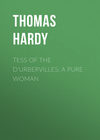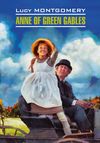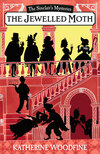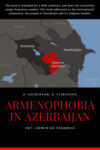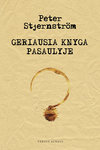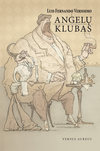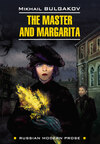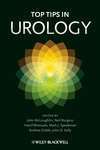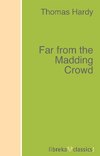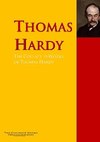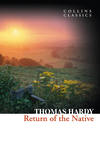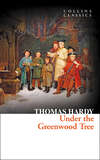Kitabı oku: «Tess of the d'Urbervilles: A Pure Woman», sayfa 28
LII
During the small hours of the next morning, while it was still dark, dwellers near the highways were conscious of a disturbance of their night's rest by rumbling noises, intermittently continuing till daylight – noises as certain to recur in this particular first week of the month as the voice of the cuckoo in the third week of the same. They were the preliminaries of the general removal, the passing of the empty waggons and teams to fetch the goods of the migrating families; for it was always by the vehicle of the farmer who required his services that the hired man was conveyed to his destination. That this might be accomplished within the day was the explanation of the reverberation occurring so soon after midnight, the aim of the carters being to reach the door of the outgoing households by six o'clock, when the loading of their movables at once began.
But to Tess and her mother's household no such anxious farmer sent his team. They were only women; they were not regular labourers; they were not particularly required anywhere; hence they had to hire a waggon at their own expense, and got nothing sent gratuitously.
It was a relief to Tess, when she looked out of the window that morning, to find that though the weather was windy and louring, it did not rain, and that the waggon had come. A wet Lady-Day was a spectre which removing families never forgot; damp furniture, damp bedding, damp clothing accompanied it, and left a train of ills.
Her mother, 'Liza-Lu, and Abraham were also awake, but the younger children were let sleep on. The four breakfasted by the thin light, and the "house-ridding" was taken in hand.
It proceeded with some cheerfulness, a friendly neighbour or two assisting. When the large articles of furniture had been packed in position, a circular nest was made of the beds and bedding, in which Joan Durbeyfield and the young children were to sit through the journey. After loading there was a long delay before the horses were brought, these having been unharnessed during the ridding; but at length, about two o'clock, the whole was under way, the cooking-pot swinging from the axle of the waggon, Mrs Durbeyfield and family at the top, the matron having in her lap, to prevent injury to its works, the head of the clock, which, at any exceptional lurch of the waggon, struck one, or one-and-a-half, in hurt tones. Tess and the next eldest girl walked alongside till they were out of the village.
They had called on a few neighbours that morning and the previous evening, and some came to see them off, all wishing them well, though, in their secret hearts, hardly expecting welfare possible to such a family, harmless as the Durbeyfields were to all except themselves. Soon the equipage began to ascend to higher ground, and the wind grew keener with the change of level and soil.
The day being the sixth of April, the Durbeyfield waggon met many other waggons with families on the summit of the load, which was built on a wellnigh unvarying principle, as peculiar, probably, to the rural labourer as the hexagon to the bee. The groundwork of the arrangement was the family dresser, which, with its shining handles, and finger-marks, and domestic evidences thick upon it, stood importantly in front, over the tails of the shaft-horses, in its erect and natural position, like some Ark of the Covenant that they were bound to carry reverently.
Some of the households were lively, some mournful; some were stopping at the doors of wayside inns; where, in due time, the Durbeyfield menagerie also drew up to bait horses and refresh the travellers.
During the halt Tess's eyes fell upon a three-pint blue mug, which was ascending and descending through the air to and from the feminine section of a household, sitting on the summit of a load that had also drawn up at a little distance from the same inn. She followed one of the mug's journeys upward, and perceived it to be clasped by hands whose owner she well knew. Tess went towards the waggon.
"Marian and Izz!" she cried to the girls, for it was they, sitting with the moving family at whose house they had lodged. "Are you house-ridding to-day, like everybody else?"
They were, they said. It had been too rough a life for them at Flintcomb-Ash, and they had come away, almost without notice, leaving Groby to prosecute them if he chose. They told Tess their destination, and Tess told them hers.
Marian leant over the load, and lowered her voice. "Do you know that the gentleman who follows 'ee – you'll guess who I mean – came to ask for 'ee at Flintcomb after you had gone? We didn't tell'n where you was, knowing you wouldn't wish to see him."
"Ah – but I did see him!" Tess murmured. "He found me."
"And do he know where you be going?"
"I think so."
"Husband come back?"
"No."
She bade her acquaintance goodbye – for the respective carters had now come out from the inn – and the two waggons resumed their journey in opposite directions; the vehicle whereon sat Marian, Izz, and the ploughman's family with whom they had thrown in their lot, being brightly painted, and drawn by three powerful horses with shining brass ornaments on their harness; while the waggon on which Mrs Durbeyfield and her family rode was a creaking erection that would scarcely bear the weight of the superincumbent load; one which had known no paint since it was made, and drawn by two horses only. The contrast well marked the difference between being fetched by a thriving farmer and conveying oneself whither no hirer waited one's coming.
The distance was great – too great for a day's journey – and it was with the utmost difficulty that the horses performed it. Though they had started so early, it was quite late in the afternoon when they turned the flank of an eminence which formed part of the upland called Greenhill. While the horses stood to stale and breathe themselves Tess looked around. Under the hill, and just ahead of them, was the half-dead townlet of their pilgrimage, Kingsbere, where lay those ancestors of whom her father had spoken and sung to painfulness: Kingsbere, the spot of all spots in the world which could be considered the d'Urbervilles' home, since they had resided there for full five hundred years.
A man could be seen advancing from the outskirts towards them, and when he beheld the nature of their waggon-load he quickened his steps.
"You be the woman they call Mrs Durbeyfield, I reckon?" he said to Tess's mother, who had descended to walk the remainder of the way.
She nodded. "Though widow of the late Sir John d'Urberville, poor nobleman, if I cared for my rights; and returning to the domain of his forefathers."
"Oh? Well, I know nothing about that; but if you be Mrs Durbeyfield, I am sent to tell 'ee that the rooms you wanted be let. We didn't know that you was coming till we got your letter this morning – when 'twas too late. But no doubt you can get other lodgings somewhere."
The man had noticed the face of Tess, which had become ash-pale at his intelligence. Her mother looked hopelessly at fault. "What shall we do now, Tess?" she said bitterly. "Here's a welcome to your ancestors' lands! However, let's try further."
They moved on into the town, and tried with all their might, Tess remaining with the waggon to take care of the children whilst her mother and 'Liza-Lu made inquiries. At the last return of Joan to the vehicle, an hour later, when her search for accommodation had still been fruitless, the driver of the waggon said the goods must be unloaded, as the horses were half-dead, and he was bound to return part of the way at least that night.
"Very well – unload it here," said Joan recklessly. "I'll get shelter somewhere."
The waggon had drawn up under the churchyard wall, in a spot screened from view, and the driver, nothing loth, soon hauled down the poor heap of household goods. This done, she paid him, reducing herself to almost her last shilling thereby, and he moved off and left them, only too glad to get out of further dealings with such a family. It was a dry night, and he guessed that they would come to no harm.
Tess gazed desperately at the pile of furniture. The cold sunlight of this spring evening peered invidiously upon the crocks and kettles, upon the bunches of dried herbs shivering in the breeze, upon the brass handles of the dresser, upon the wicker-cradle they had all been rocked in, and upon the well-rubbed clock-case, all of which gave out the reproachful gleam of indoor articles abandoned to the vicissitudes of a roofless exposure for which they were never made. Round about were deparked hills and slopes – now cut up into little paddocks – and the green foundations that showed where the d'Urberville mansion once had stood; also an outlying stretch of Egdon Heath that had always belonged to the estate. Hard by, the aisle of the church called the d'Urberville Aisle looked on imperturbably.
"Isn't your family vault your own freehold?" said Tess's mother, as she returned from a reconnoitre of the church and graveyard. "Why, of course 'tis, and that's where we will camp, girls, till the place of your ancestors finds us a roof! Now, Tess and 'Liza and Abraham, you help me. We'll make a nest for these children, and then we'll have another look round."
Tess listlessly lent a hand, and in a quarter of an hour the old four-post bedstead was dissociated from the heap of goods, and erected under the south wall of the church, the part of the building known as the d'Urberville Aisle, beneath which the huge vaults lay. Over the tester of the bedstead was a beautiful traceried window, of many lights, its date being the fifteenth century. It was called the d'Urberville Window, and in the upper part could be discerned heraldic emblems like those on Durbeyfield's old seal and spoon.
Joan drew the curtains round the bed so as to make an excellent tent of it, and put the smaller children inside. "If it comes to the worst we can sleep there too, for one night," she said. "But let us try further on, and get something for the dears to eat! O, Tess, what's the use of your playing at marrying gentlemen, if it leaves us like this!"
Accompanied by 'Liza-Lu and the boy, she again ascended the little lane which secluded the church from the townlet. As soon as they got into the street they beheld a man on horseback gazing up and down. "Ah – I'm looking for you!" he said, riding up to them. "This is indeed a family gathering on the historic spot!"
It was Alec d'Urberville. "Where is Tess?" he asked.
Personally Joan had no liking for Alec. She cursorily signified the direction of the church, and went on, d'Urberville saying that he would see them again, in case they should be still unsuccessful in their search for shelter, of which he had just heard. When they had gone, d'Urberville rode to the inn, and shortly after came out on foot.
In the interim Tess, left with the children inside the bedstead, remained talking with them awhile, till, seeing that no more could be done to make them comfortable just then, she walked about the churchyard, now beginning to be embrowned by the shades of nightfall. The door of the church was unfastened, and she entered it for the first time in her life.
Within the window under which the bedstead stood were the tombs of the family, covering in their dates several centuries. They were canopied, altar-shaped, and plain; their carvings being defaced and broken; their brasses torn from the matrices, the rivet-holes remaining like martin-holes in a sandcliff. Of all the reminders that she had ever received that her people were socially extinct, there was none so forcible as this spoliation.
She drew near to a dark stone on which was inscribed:
OSTIUM SEPULCHRI ANTIQUAE FAMILIAE D'URBERVILLE
Tess did not read Church-Latin like a Cardinal, but she knew that this was the door of her ancestral sepulchre, and that the tall knights of whom her father had chanted in his cups lay inside.
She musingly turned to withdraw, passing near an altar-tomb, the oldest of them all, on which was a recumbent figure. In the dusk she had not noticed it before, and would hardly have noticed it now but for an odd fancy that the effigy moved. As soon as she drew close to it she discovered all in a moment that the figure was a living person; and the shock to her sense of not having been alone was so violent that she was quite overcome, and sank down nigh to fainting, not, however, till she had recognized Alec d'Urberville in the form.
He leapt off the slab and supported her.
"I saw you come in," he said smiling, "and got up there not to interrupt your meditations. A family gathering, is it not, with these old fellows under us here? Listen."
He stamped with his heel heavily on the floor; whereupon there arose a hollow echo from below.
"That shook them a bit, I'll warrant!" he continued. "And you thought I was the mere stone reproduction of one of them. But no. The old order changeth. The little finger of the sham d'Urberville can do more for you than the whole dynasty of the real underneath … Now command me. What shall I do?"
"Go away!" she murmured.
"I will – I'll look for your mother," said he blandly. But in passing her he whispered: "Mind this; you'll be civil yet!"
When he was gone she bent down upon the entrance to the vaults, and said —
"Why am I on the wrong side of this door!"
In the meantime Marian and Izz Huett had journeyed onward with the chattels of the ploughman in the direction of their land of Canaan – the Egypt of some other family who had left it only that morning. But the girls did not for a long time think of where they were going. Their talk was of Angel Clare and Tess, and Tess's persistent lover, whose connection with her previous history they had partly heard and partly guessed ere this.
"'Tisn't as though she had never known him afore," said Marian. "His having won her once makes all the difference in the world. 'Twould be a thousand pities if he were to tole her away again. Mr Clare can never be anything to us, Izz; and why should we grudge him to her, and not try to mend this quarrel? If he could on'y know what straits she's put to, and what's hovering round, he might come to take care of his own."
"Could we let him know?"
They thought of this all the way to their destination; but the bustle of re-establishment in their new place took up all their attention then. But when they were settled, a month later, they heard of Clare's approaching return, though they had learnt nothing more of Tess. Upon that, agitated anew by their attachment to him, yet honourably disposed to her, Marian uncorked the penny ink-bottle they shared, and a few lines were concocted between the two girls.
Honour'd Sir —
Look to your Wife if you do love her as much as she do love you. For she is sore put to by an Enemy in the shape of a Friend. Sir, there is one near her who ought to be Away. A woman should not be try'd beyond her Strength, and continual dropping will wear away a Stone – ay, more – a Diamond.
From Two Well-Wishers
This was addressed to Angel Clare at the only place they had ever heard him to be connected with, Emminster Vicarage; after which they continued in a mood of emotional exaltation at their own generosity, which made them sing in hysterical snatches and weep at the same time.
End of Phase the Sixth
Phase the Seventh: Fulfilment, LIII-LIX
LIII
It was evening at Emminster Vicarage. The two customary candles were burning under their green shades in the Vicar's study, but he had not been sitting there. Occasionally he came in, stirred the small fire which sufficed for the increasing mildness of the spring, and went out again; sometimes pausing at the front door, going on to the drawing-room, then returning again to the front door.
It faced westward, and though gloom prevailed inside, there was still light enough without to see with distinctness. Mrs Clare, who had been sitting in the drawing-room, followed him hither.
"Plenty of time yet," said the Vicar. "He doesn't reach Chalk-Newton till six, even if the train should be punctual, and ten miles of country-road, five of them in Crimmercrock Lane, are not jogged over in a hurry by our old horse."
"But he has done it in an hour with us, my dear."
"Years ago."
Thus they passed the minutes, each well knowing that this was only waste of breath, the one essential being simply to wait.
At length there was a slight noise in the lane, and the old pony-chaise appeared indeed outside the railings. They saw alight therefrom a form which they affected to recognize, but would actually have passed by in the street without identifying had he not got out of their carriage at the particular moment when a particular person was due.
Mrs Clare rushed through the dark passage to the door, and her husband came more slowly after her.
The new arrival, who was just about to enter, saw their anxious faces in the doorway and the gleam of the west in their spectacles because they confronted the last rays of day; but they could only see his shape against the light.
"O, my boy, my boy – home again at last!" cried Mrs Clare, who cared no more at that moment for the stains of heterodoxy which had caused all this separation than for the dust upon his clothes. What woman, indeed, among the most faithful adherents of the truth, believes the promises and threats of the Word in the sense in which she believes in her own children, or would not throw her theology to the wind if weighed against their happiness? As soon as they reached the room where the candles were lighted she looked at his face.
"O, it is not Angel – not my son – the Angel who went away!" she cried in all the irony of sorrow, as she turned herself aside.
His father, too, was shocked to see him, so reduced was that figure from its former contours by worry and the bad season that Clare had experienced, in the climate to which he had so rashly hurried in his first aversion to the mockery of events at home. You could see the skeleton behind the man, and almost the ghost behind the skeleton. He matched Crivelli's dead Christus. His sunken eye-pits were of morbid hue, and the light in his eyes had waned. The angular hollows and lines of his aged ancestors had succeeded to their reign in his face twenty years before their time.
"I was ill over there, you know," he said. "I am all right now."
As if, however, to falsify this assertion, his legs seemed to give way, and he suddenly sat down to save himself from falling. It was only a slight attack of faintness, resulting from the tedious day's journey, and the excitement of arrival.
"Has any letter come for me lately?" he asked. "I received the last you sent on by the merest chance, and after considerable delay through being inland; or I might have come sooner."
"It was from your wife, we supposed?"
"It was."
Only one other had recently come. They had not sent it on to him, knowing he would start for home so soon.
He hastily opened the letter produced, and was much disturbed to read in Tess's handwriting the sentiments expressed in her last hurried scrawl to him.
O why have you treated me so monstrously, Angel! I do not deserve it. I have thought it all over carefully, and I can never, never forgive you! You know that I did not intend to wrong you – why have you so wronged me? You are cruel, cruel indeed! I will try to forget you. It is all injustice I have received at your hands!
T.
"It is quite true!" said Angel, throwing down the letter. "Perhaps she will never be reconciled to me!"
"Don't, Angel, be so anxious about a mere child of the soil!" said his mother.
"Child of the soil! Well, we all are children of the soil. I wish she were so in the sense you mean; but let me now explain to you what I have never explained before, that her father is a descendant in the male line of one of the oldest Norman houses, like a good many others who lead obscure agricultural lives in our villages, and are dubbed 'sons of the soil.'"
He soon retired to bed; and the next morning, feeling exceedingly unwell, he remained in his room pondering. The circumstances amid which he had left Tess were such that though, while on the south of the Equator and just in receipt of her loving epistle, it had seemed the easiest thing in the world to rush back into her arms the moment he chose to forgive her, now that he had arrived it was not so easy as it had seemed. She was passionate, and her present letter, showing that her estimate of him had changed under his delay – too justly changed, he sadly owned, – made him ask himself if it would be wise to confront her unannounced in the presence of her parents. Supposing that her love had indeed turned to dislike during the last weeks of separation, a sudden meeting might lead to bitter words.
Clare therefore thought it would be best to prepare Tess and her family by sending a line to Marlott announcing his return, and his hope that she was still living with them there, as he had arranged for her to do when he left England. He despatched the inquiry that very day, and before the week was out there came a short reply from Mrs Durbeyfield which did not remove his embarrassment, for it bore no address, though to his surprise it was not written from Marlott.
Sir,
J write these few lines to say that my Daughter is away from me at present, and J am not sure when she will return, but J will let you know as Soon as she do. J do not feel at liberty to tell you Where she is temperly biding. J should say that me and my Family have left Marlott for some Time. —
Yours,J. Durbeyfield
It was such a relief to Clare to learn that Tess was at least apparently well that her mother's stiff reticence as to her whereabouts did not long distress him. They were all angry with him, evidently. He would wait till Mrs Durbeyfield could inform him of Tess's return, which her letter implied to be soon. He deserved no more. His had been a love "which alters when it alteration finds". He had undergone some strange experiences in his absence; he had seen the virtual Faustina in the literal Cornelia, a spiritual Lucretia in a corporeal Phryne; he had thought of the woman taken and set in the midst as one deserving to be stoned, and of the wife of Uriah being made a queen; and he had asked himself why he had not judged Tess constructively rather than biographically, by the will rather than by the deed?
A day or two passed while he waited at his father's house for the promised second note from Joan Durbeyfield, and indirectly to recover a little more strength. The strength showed signs of coming back, but there was no sign of Joan's letter. Then he hunted up the old letter sent on to him in Brazil, which Tess had written from Flintcomb-Ash, and re-read it. The sentences touched him now as much as when he had first perused them.
…I must cry to you in my trouble – I have no one else! … I think I must die if you do not come soon, or tell me to come to you… please, please, not to be just – only a little kind to me … If you would come, I could die in your arms! I would be well content to do that if so be you had forgiven me! … if you will send me one little line, and say, "I am coming soon," I will bide on, Angel – O, so cheerfully! … think how it do hurt my heart not to see you ever – ever! Ah, if I could only make your dear heart ache one little minute of each day as mine does every day and all day long, it might lead you to show pity to your poor lonely one. … I would be content, ay, glad, to live with you as your servant, if I may not as your wife; so that I could only be near you, and get glimpses of you, and think of you as mine. … I long for only one thing in heaven or earth or under the earth, to meet you, my own dear! Come to me – come to me, and save me from what threatens me!
Clare determined that he would no longer believe in her more recent and severer regard of him, but would go and find her immediately. He asked his father if she had applied for any money during his absence. His father returned a negative, and then for the first time it occurred to Angel that her pride had stood in her way, and that she had suffered privation. From his remarks his parents now gathered the real reason of the separation; and their Christianity was such that, reprobates being their especial care, the tenderness towards Tess which her blood, her simplicity, even her poverty, had not engendered, was instantly excited by her sin.
Whilst he was hastily packing together a few articles for his journey he glanced over a poor plain missive also lately come to hand – the one from Marian and Izz Huett, beginning —
"Honour'd Sir, Look to your Wife if you do love her as much as she do love you," and signed, "From Two Well-Wishers."
